(For a quicker shorter read scroll down to the BLUE FONT)
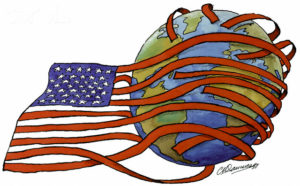
More than two hundred years ago Edward Gibbon gave nations with imperial designs the best advice they ever managed to ignore. “There is nothing more contrary to nature than the attempt to hold in obedience distant provinces.” Talk about the Cassandra syndrome (valid warnings of concern ignored or disbelieved). Lest you think America is different, let me reassure you that the U.S. is no exception to the rule of blithely tripping over the wisdom of the ages.
What follows is a brief catalog of imperial dreams turned into nightmares. First the enduring symbol of both our folly and our hubris, Vietnam. Vietnam will always be the poster child for U.S. colonial dreams of empire. First, the French reoccupied it in 1946 after the Second World War and then suffered a catastrophic defeat at Dien Bien Phu in 1954. They saw the handwriting on the wall and hastily departed. The U.S. guided by their own dreams of glory and fervent belief in their exceptionalism stayed in Vietnam 10 fruitless years. The toll: 58,000 young Americans dead, 304,000 wounded, 75,000 with lifetime disabilities. Not often mentioned (out of shame?) are more than 100,000 returning veterans who ended their own lives. The pathology of serving in Vietnam affected returning veterans in many different ways. In the decade following the war one-quarter of those veterans were arrested for criminal offenses.
Before you dismiss Vietnam as an isolated adventure of a country gone temporarily insane, think again. Unwanted and illegal interventions in countries spanning the globe have become a major preoccupation of the U.S. One minor but laughable example of your tax dollars at work. In 1810, Col. Zebulon Pike invaded Spanish territory in what came to be known as Colorado. Unfortunately, he was captured, taken to Mexico and later released. A host of territorial incursions into land owned by other nations, Spain, France, and England kept the U.S. military busy for most of the rest of that century. In 1890, an intervention occurred that was to form the rationale for most of America’s 20th century escapades, American marines invaded Argentina to “protect” the U.S. embassy in Buenos Aires, but wink, wink, nod, nod, what they were really protecting were U.S. business interests.
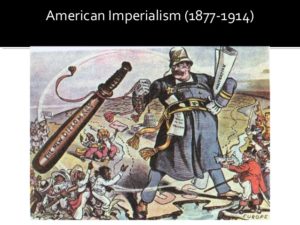 The catalogue of excesses from the late nineteenth century to well into the twentieth is stunning. In 1898, the U.S. wrested the Philippines, Puerto Rico and Cuba from Spain in bloody interventions that killed thousands of inhabitants. In the first half of the twentieth century, U.S. marines kept busy in Nicaragua, Haiti, Dominican Republic, Honduras and Panama. As important as who we were fighting is what we were fighting for. Owning most of the political “juice” by dint of their influence and wealth, America’s largest corporations and the military-industrial complex were in the driver’s seat and almost but not quite driving off the cliff. By the beginning of the 20th century, it was indisputable that America’s strategic interests were inseparable from those of her corporate and military masters.
The catalogue of excesses from the late nineteenth century to well into the twentieth is stunning. In 1898, the U.S. wrested the Philippines, Puerto Rico and Cuba from Spain in bloody interventions that killed thousands of inhabitants. In the first half of the twentieth century, U.S. marines kept busy in Nicaragua, Haiti, Dominican Republic, Honduras and Panama. As important as who we were fighting is what we were fighting for. Owning most of the political “juice” by dint of their influence and wealth, America’s largest corporations and the military-industrial complex were in the driver’s seat and almost but not quite driving off the cliff. By the beginning of the 20th century, it was indisputable that America’s strategic interests were inseparable from those of her corporate and military masters.
A funny thing happened after Vietnam. The American people en masse started demanding that their leaders stay out of long, drawn-out wars, particularly ones we couldn’t win, which, after World War II was all of them. The military called it the “Vietnam syndrome” and spent the next two decades trying to wean us off it. The 1990 Gulf War was like a gift from heaven for the U.S. military. Their sighs of relief could be heard all over the Pentagon.
Perpetual war also solved the problems corporate America was facing as it pulled up stakes and left America for greener pasture. You know where they were heading —to countries holding out the welcome mat in the form of union-free sweat shops where decent working conditions, fair pay, child labor laws and other workplace protections didn’t exist.
 To continue this tale of imperial might with few rewards. If it’s 1985, it must be Iran contra, President Reagan’s gift to the U.S. perpetual war machine. With a nod in the direction of international law and pretend fealty to the principle of national sovereignty (which most Americans believe applies only to our sovereignty, not anyone else’s), the U.S. was up to its old tricks —illegal weapons sales to support “anti-communist” regimes aiming to overthrow democratically elected leaders in South America. Reagan had lots of henchmen, National Security Advisor, John Poindexter, and his buddy Col. Oliver North NSC member, CIA Chief, William Casey (who had the good fortune to die before he was forced to testify before a congressional investigating committee once the tawdry affair was exposed) and Defense Secretary, Caspar Weinberger (who held the short straw and was the only official indicted on criminal charges for his role in Iran contra. A presidential pardon saved his bacon). There were other “responsible” government officials in on the criminality — funneling weapons to Iran (via our old ‘friend’ Israel) in exchange for American hostages (crime no. 1) and sending some of the money they received (only a portion as millions went MIA, probably to numbered bank accounts belonging to one or more of the conspirators) to the Nicaraguan Contras. At this time, they were a U.S. “fav,” a right-wing band of thugs trying to overthrow the government of the Sandinista National Liberation Front. In an ironic twist, the Sandinistas took their name from a national hero, Augusto Sandino, best known for throwing out American marines who invaded and occupied the country in the 1930’s. Avenging angels don’t come cheap, the Contras were richly rewarded, in both arms and financial support, for erasing that blot on America’s military might. (crime no. 2). Speak up if you see a pattern here.
To continue this tale of imperial might with few rewards. If it’s 1985, it must be Iran contra, President Reagan’s gift to the U.S. perpetual war machine. With a nod in the direction of international law and pretend fealty to the principle of national sovereignty (which most Americans believe applies only to our sovereignty, not anyone else’s), the U.S. was up to its old tricks —illegal weapons sales to support “anti-communist” regimes aiming to overthrow democratically elected leaders in South America. Reagan had lots of henchmen, National Security Advisor, John Poindexter, and his buddy Col. Oliver North NSC member, CIA Chief, William Casey (who had the good fortune to die before he was forced to testify before a congressional investigating committee once the tawdry affair was exposed) and Defense Secretary, Caspar Weinberger (who held the short straw and was the only official indicted on criminal charges for his role in Iran contra. A presidential pardon saved his bacon). There were other “responsible” government officials in on the criminality — funneling weapons to Iran (via our old ‘friend’ Israel) in exchange for American hostages (crime no. 1) and sending some of the money they received (only a portion as millions went MIA, probably to numbered bank accounts belonging to one or more of the conspirators) to the Nicaraguan Contras. At this time, they were a U.S. “fav,” a right-wing band of thugs trying to overthrow the government of the Sandinista National Liberation Front. In an ironic twist, the Sandinistas took their name from a national hero, Augusto Sandino, best known for throwing out American marines who invaded and occupied the country in the 1930’s. Avenging angels don’t come cheap, the Contras were richly rewarded, in both arms and financial support, for erasing that blot on America’s military might. (crime no. 2). Speak up if you see a pattern here.
Proving that America’s memory deficit rivals its financial one, not four years later in 1989, President George H.W. got tired of fighting the war on drugs on our side of the border when there was a whole other side to invade. Besides his political fortunes were dimming and it was time for a little war (one the U.S. could win). Panama popped onto his radar, a dream come true. Manuel Noriega, Panamanian dictator and CIA asset was fast becoming a liability, among other sins, restarting the importation of drugs into the U.S, posing a major public relations problem for the administration. Something had to be done before someone blew the whistle on how long U.S. officials had turned a blind eye to Noriega’s little business enterprises. First, the United States tried to pick a fight over what it deemed the threat to the security of the Panama Canal. Noriega having been well trained by his CIA handlers was too crafty to fall into that trap. No threats against the Panama Canal. The U.S. turned to Plan B —rekindling the much-maligned war on drugs, the perfect link to campaign rhetoric promising to “get tough on drugs.”
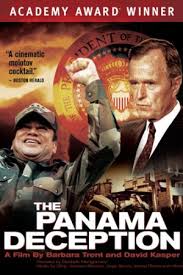 You can guess what happened next —what always happens next when the U.S. is looking for a quick war to beef up public morale. President Bush ordered 24,000 American troops into Panama, followed by the obligatory “address to the nation” from the Oval Office. Picture it — Bush, sitting behind his desk, every inch a commander-in-chief, solemnly explaining to a somewhat bewildered public the latest humanitarian crisis American troops were about to avert: “the imminent danger to 35,000 American citizens in Panama… Not surprisingly, many of these “endangered” Americans, interviewed later, affirmed that they felt more threatened by the American troops come to save them. Like all President before and after him, he was also doing God’s work “defend[ing] democracy in Panama.”
You can guess what happened next —what always happens next when the U.S. is looking for a quick war to beef up public morale. President Bush ordered 24,000 American troops into Panama, followed by the obligatory “address to the nation” from the Oval Office. Picture it — Bush, sitting behind his desk, every inch a commander-in-chief, solemnly explaining to a somewhat bewildered public the latest humanitarian crisis American troops were about to avert: “the imminent danger to 35,000 American citizens in Panama… Not surprisingly, many of these “endangered” Americans, interviewed later, affirmed that they felt more threatened by the American troops come to save them. Like all President before and after him, he was also doing God’s work “defend[ing] democracy in Panama.”
While the President was nattering away, 16,000 Panamanians, the entire army, of whom barely 4,000 knew which end of a gun to aim found themselves badly overmatched. In short order, Noriega surrendered and was summarily deposited in an American prison after a perfunctory trial. He died in 2016 after being extradited to Panama.
Ganging up on our neighbors in South America is a bipartisan effort. Haiti is the best – and saddest example of this bipartisan imperial crusade. After being occupied by U.S. marines from 1915-1934, under the noses of both Republicans, Coolidge and Cleveland, and Democrats Wilson and Franklin Roosevelt who may have been our first “I feel your pain President (not including when it interferes with the U.S. corporate welfare program). President Roosevelt, no doubt overwhelmed by the plight of the poor Haitians or more likely in the absence of strong corporate interest in the country, two years after being elected, invoked his “good neighbor policy” and withdrew American troops. The Haitian weren’t out of the woods yet. On the heels of the American occupation, came the autocratic rule of two generations of Duvaliers and their band of armed thugs, the dreaded Tonton Macoute. In 1991, Jean Bertrand Aristide, left leaning Catholic priest, became the country’s first elected leader. He was in and out of power until 2004 when President Clinton, not satisfied with imposing land “reforms” in Haiti forcing hundreds of Haitians off their land into sweat shops and seizing acres of farm land for transnational corporations, sent him packing to the Central African Republic. In 2011, after Haiti’s catastrophic earthquake he was allowed to return although forbidden to revive his popular political party.
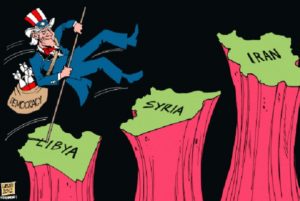 Presidents come and go. Not US militarism. In the last three decades, the U.S. has wreaked a wide swathe of death and destruction across Europe, the Mid-East and Africa. Whether it’s the Balkans (President Clinton), Iraq and Afghanistan (President George W. Bush), or the apex of destruction, 7 countries and probably a few we don’t yet know about in President Obama’s reign. Our newest President will no doubt add his “conquests” to the list.
Presidents come and go. Not US militarism. In the last three decades, the U.S. has wreaked a wide swathe of death and destruction across Europe, the Mid-East and Africa. Whether it’s the Balkans (President Clinton), Iraq and Afghanistan (President George W. Bush), or the apex of destruction, 7 countries and probably a few we don’t yet know about in President Obama’s reign. Our newest President will no doubt add his “conquests” to the list.
***Quicker Read Start Here——>>>>
Today the U.S. is facing the consequences of those rapacious forays across the globe. Consequences that strike at the heart of the civil liberties Americans have perhaps taken for granted for far too long. That danger may well be the enduring legacy of the Obama years. Americans face a double threat —from outside our borders in the forms of blowback from “accidental” terrorists, those whose lives have been shattered, their loved ones killed from US bombing raids and those of our proxies (think Saudi Arabia in Yemen, the Free Syrian Army in Syria, and Israel almost everywhere) and more alarming from the inside — the ticking time bomb President Obama left “on the table” in the form of the 2012 National Defense Authorization (NDAA). One provision, section 1021, makes it possible for the President to detain persons, including American citizens, suspected of terrorist activities or even sympathies indefinitely. without charge or trial in military prisons.  President Obama issued a “signing statement” indicating he had “serious reservations” about some of the provisions including 1021. Not serious enough, apparently, to make him think twice about signing the bill. In fact, the signing statement was a remarkably tepid disclaimer of a bill that could result in a sweeping assault on Americans’ civil liberties. “My Administration will not authorize the indefinite military detention without trial of American citizens.” Tony Romero, the executive director of the ACLU, wasn’t buying it “President Obama’s action [signing the 2012 NDAA containing section 1021] …is a blight on his legacy because he will forever be known as the president who signed indefinite detention without charge or trial into law.”
President Obama issued a “signing statement” indicating he had “serious reservations” about some of the provisions including 1021. Not serious enough, apparently, to make him think twice about signing the bill. In fact, the signing statement was a remarkably tepid disclaimer of a bill that could result in a sweeping assault on Americans’ civil liberties. “My Administration will not authorize the indefinite military detention without trial of American citizens.” Tony Romero, the executive director of the ACLU, wasn’t buying it “President Obama’s action [signing the 2012 NDAA containing section 1021] …is a blight on his legacy because he will forever be known as the president who signed indefinite detention without charge or trial into law.”
Signing statements are a double-edged sword. For example, President Obama’s signing statement only applies to how his administration would use the authority granted to the Executive Branch by the NDAA. The statement has no effect whatsoever on how the law is interpreted or enforced by subsequent administrations. It’s a new day with Donald Trump and his crew taking over the Executive Branch. The indefinite detention of Americans in military prisons is the sword of Damocles hanging over the heads of Americans who exercise their first amendment rights. Was our former constitutional lawyer-turned-president unaware of the power he was transferring from the American people to the Executive Branch of government? Are we finally at the point where we have more to fear from our own government than from outside forces?
Is the creeping threat to our own civil liberties the “natural” outgrowth of our international assault on civil liberties in countries all over the globe —aiding and abetting the assassinations of grassroots movement leaders standing up for democracy and nationalism (Mossadegh in Iran) providing murderous regimes economic and military assistance (Shah of Iran) and training their private armies of thugs and sociopaths (Brazilian death squads). Wrecking economies is another specialty of the American war machine. In league with the World Bank and IMF, farms and rural enterprises are destroyed to serve the interests of transnational corporations looking for the opportunity to seize the land of impoverished populations and doom them to working on the cheap in urban sweatshops. Our “free trade” deals bankrupt local economics and force austerity and privatization, the gods of neo-liberalism, to serve the needs of bankers, hedge fund managers and multi-national corporations.
Are the chickens finally coming home to roost? Are Americans about to turn from onlookers to participants in the U.S. war on civil liberties? In this new era, will protestors be grabbed off the streets and “disappeared” into military prison camps indefinitely? While 1021 is a major threat, it isn’t the only one on the horizon. There is another one, 73 years old and, although discredited,
still a fixture in American constitutional law. In 1944, the Supreme Court in Korematsu v. United States upheld the constitutionality of President Roosevelt’s 1942 executive order 9066 authorizing the military to remove 110,000 Americans of Japanese ancestry from their homes and confine them in military concentration camps where they remained for four long years.  Korematsu has never been overturned. According to Justice Stephen Breyer The decision has been so thoroughly discredited that it is hard to conceive of any future court…relying on it.” You want to stake your first amendment freedoms on that assurance? Before you answer, consider that Korematsu was passed when World War II was going full bore and wartime hysteria buoyed by racism was on the minds of the Justices. In 2017, the similarities are eerie. The U.S. is in perpetual war with combat troops in seven countries, national wartime hysteria punctuated by cries of “keeping us safe” are used to justify the assault on civil liberties and another racial minority, Muslim Americans, have become perpetual “persons of interest.” Is Justice Breyer right or would it be more prudent to listen to the late Chief Justice William Rehnquist — “There is no reason to think that future wartime presidents will act differently from Lincoln, Wilson, or Roosevelt, or that future Justices of the Supreme Court will decide questions differently than their predecessors.” The late Justice Antonin Scalia had the same concerns about the future actions of both the Executive Branch and the Supreme Court under wartime conditions — “the Supreme Court’s Korematsu decision upholding the internment of Japanese Americans was wrong, but it could happen again in war time.”
Korematsu has never been overturned. According to Justice Stephen Breyer The decision has been so thoroughly discredited that it is hard to conceive of any future court…relying on it.” You want to stake your first amendment freedoms on that assurance? Before you answer, consider that Korematsu was passed when World War II was going full bore and wartime hysteria buoyed by racism was on the minds of the Justices. In 2017, the similarities are eerie. The U.S. is in perpetual war with combat troops in seven countries, national wartime hysteria punctuated by cries of “keeping us safe” are used to justify the assault on civil liberties and another racial minority, Muslim Americans, have become perpetual “persons of interest.” Is Justice Breyer right or would it be more prudent to listen to the late Chief Justice William Rehnquist — “There is no reason to think that future wartime presidents will act differently from Lincoln, Wilson, or Roosevelt, or that future Justices of the Supreme Court will decide questions differently than their predecessors.” The late Justice Antonin Scalia had the same concerns about the future actions of both the Executive Branch and the Supreme Court under wartime conditions — “the Supreme Court’s Korematsu decision upholding the internment of Japanese Americans was wrong, but it could happen again in war time.”
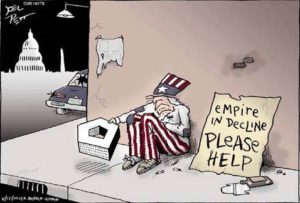 Could this be the fate of a nation defined by its hyper-militarism and drunk on the vision of imperial greatness? Before we let the Senate authorize a $59 billion bump in the military budget, we would do well to ponder the words of Martin Luther King, Jr., 50 years ago: “A nation that continues year after year to spend more money on military defense than on programs of social uplift is approaching spiritual death.” Spiritual death in the form of revocation of the freedoms that, while often more aspirational than real, made us an open society. If the door slams shut on those freedoms under the spurious notion of “keeping us safe,” we have no one to blame but ourselves.
Could this be the fate of a nation defined by its hyper-militarism and drunk on the vision of imperial greatness? Before we let the Senate authorize a $59 billion bump in the military budget, we would do well to ponder the words of Martin Luther King, Jr., 50 years ago: “A nation that continues year after year to spend more money on military defense than on programs of social uplift is approaching spiritual death.” Spiritual death in the form of revocation of the freedoms that, while often more aspirational than real, made us an open society. If the door slams shut on those freedoms under the spurious notion of “keeping us safe,” we have no one to blame but ourselves.
837 total views, 1 views today
